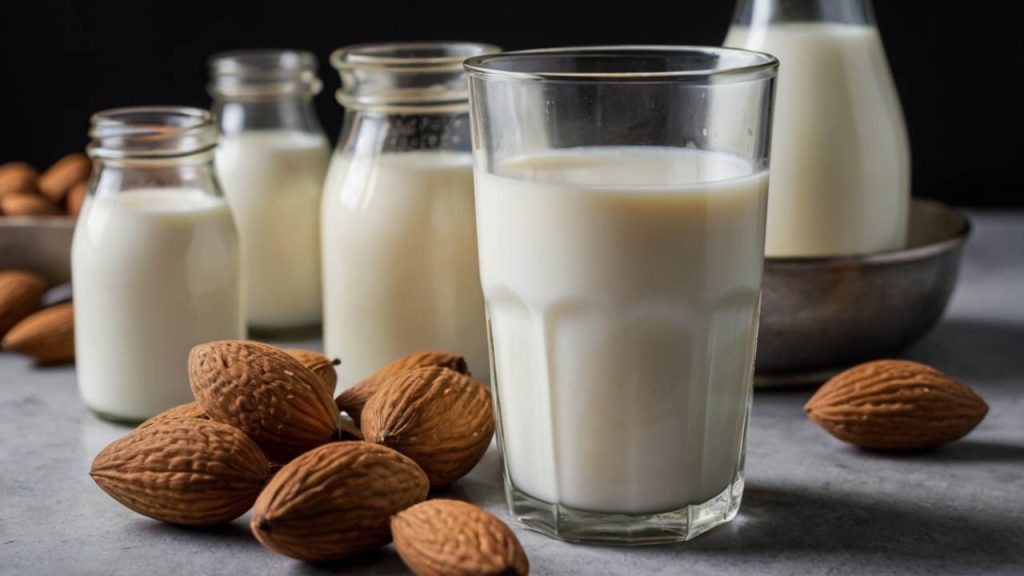The Ultimate Guide: Is Almond Milk Bad for Dogs?
The story is a modern one, a familiar scene in a health-conscious household. You reach into the refrigerator for a carton of almond milk to pour over your granola, and you notice your dog watching you intently, perhaps licking their lips in anticipation. It’s a healthy, plant-based choice for you, so the thought naturally crosses your mind: “Can I share this?” This leads to the very important and frequently asked question, “Is almond milk bad for dogs?” While plain almonds themselves are not toxic, the story of almond milk is a cautionary tale filled with hidden ingredients and potential health risks that every owner must understand.
This comprehensive guide will tell the complete story of why this popular dairy alternative is generally not a good choice for our canine friends. We will begin by explaining the fundamental reasons why almond milk, even in its simplest form, is not ideal for a dog’s digestive system. Subsequently, and most critically, we will uncover the serious dangers lurking in many commercial brands, from poisonous sweeteners to unhealthy additives. Furthermore, we will clarify why it offers no real nutritional benefits. Consequently, you will be empowered with a clear, science-backed understanding of why the answer to “Is almond milk bad for dogs?” is, for the most part, a resounding “yes.”
Why You Must Question if Almond Milk is Bad for Dogs
Before we break down the risks, it’s vital to understand that a dog’s nutritional needs and digestive capabilities are very different from our own. While we may thrive on a varied, plant-heavy diet, a dog’s system is optimized for its own species-appropriate food. Introducing human foods, especially processed ones like almond milk, can disrupt their digestive balance and, in some cases, expose them to dangerous ingredients. The story is not about whether a single lick will cause harm, but whether it’s a wise or healthy choice in the long run. The answer is almost always no.

The Primary Reasons Why Almond Milk is Bad for Dogs
The story of why almond milk is a poor choice has several key plot points. Even if you choose the “safest” possible version, it’s still not an ideal treat.
Optimizing Your Understanding of the Digestive Risks
Dogs are not naturally equipped to digest nuts in large quantities.
- Gastrointestinal Upset: The fats and plant compounds in almond milk can be difficult for a dog’s stomach to process, potentially leading to symptoms like vomiting, diarrhea, gas, and abdominal discomfort.
- High Fat Content: While almond milk is mostly water, the almonds it’s derived from are high in fat. Some brands add extra oils to improve creaminess. High-fat foods can be a trigger for pancreatitis in susceptible dogs, a painful and serious inflammation of the pancreas.
The Lack of Nutritional Value for Canines
The most compelling reason is almond milk bad for dogs is that it’s simply not good for them.
- Empty Calories: Almond milk is high in calories but offers very little in the way of the protein, vitamins, and minerals that a dog actually needs. They should be getting all of their essential nutrients from their complete and balanced dog food.
- It’s Not a Good Source of Calcium: Unlike cow’s milk, almond milk is not naturally high in calcium. Any calcium it contains has been added (fortified) for human consumption, and the levels may not be appropriate for a dog.
The Most Dangerous Reason Why Almond Milk is Bad for Dogs: Hidden Ingredients
This is the most critical chapter in the story. The real danger lies in the additives found in most commercial almond milks.
The Deadly Threat of Xylitol
This is a non-negotiable, life-and-death warning.
- What it is: Xylitol is a sugar substitute that is commonly used in “sugar-free,” “lite,” or “low-calorie” products, including some almond milks.
- Why it’s Dangerous: Xylitol is extremely poisonous to dogs. Even a tiny amount can cause a sudden, massive release of insulin, leading to a life-threatening drop in blood sugar (hypoglycemia). This can cause seizures, collapse, and can quickly progress to liver failure and death. You must always read the ingredient label. The potential presence of xylitol is the number one reason to be concerned about if almond milk is bad for dogs.
The Problem with Sugar, Flavors, and Additives
- Sugar: Sweetened and flavored almond milks (like vanilla or chocolate) are loaded with sugar, which is unhealthy for dogs and contributes to obesity and dental disease.
- Thickeners and Gums: Ingredients like carrageenan and various gums are often added for texture. While not toxic, these can be a source of digestive irritation for many dogs.
The ASPCA Animal Poison Control Center is an essential resource that lists xylitol as one of the most dangerous toxins for pets.

The Final Verdict: Is a Little Bit Okay?
So, the story seems pretty clear. But what if your dog accidentally licks a small spill of plain, unsweetened, xylitol-free almond milk?
- The Answer: A tiny amount is unlikely to cause serious harm. However, it should never be given as a regular treat or a replacement for water. The risks far outweigh any perceived benefits. The safest and healthiest beverage for your dog is, and always will be, fresh, clean water.
A Story of Safe Choices
The story of is almond milk bad for dogs is a powerful lesson in responsible pet ownership. It reminds us that our dogs are not small, furry humans and that their dietary needs are unique. By reading labels, understanding the risks, and prioritizing their species-appropriate diet, we can show our love in the most meaningful way possible: by keeping them safe.
Have you ever had a scare with your dog eating a human food? Share your story to help other owners learn! For a complete overview of what’s safe and what’s not, be sure to check out our definitive guide on [The Ultimate List of Human Foods Your Dog Can and Can’t Eat].


